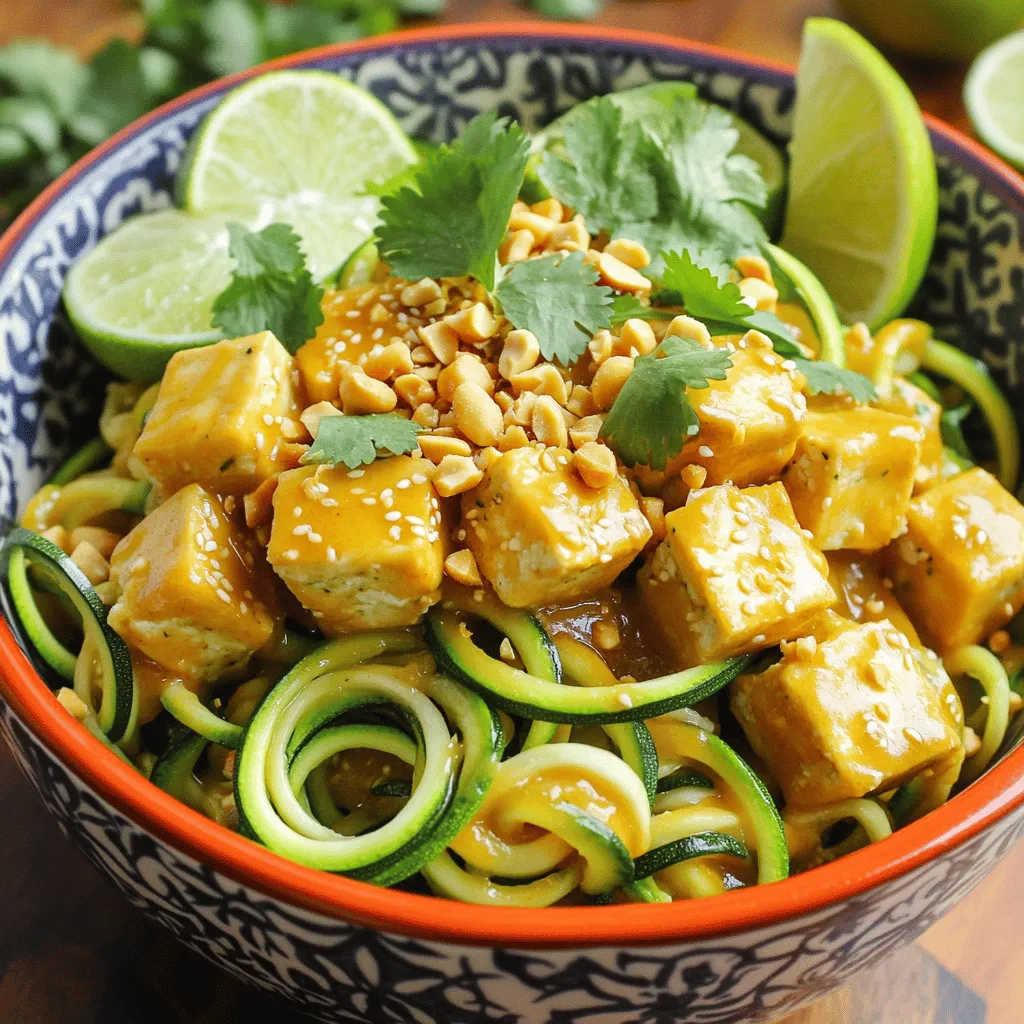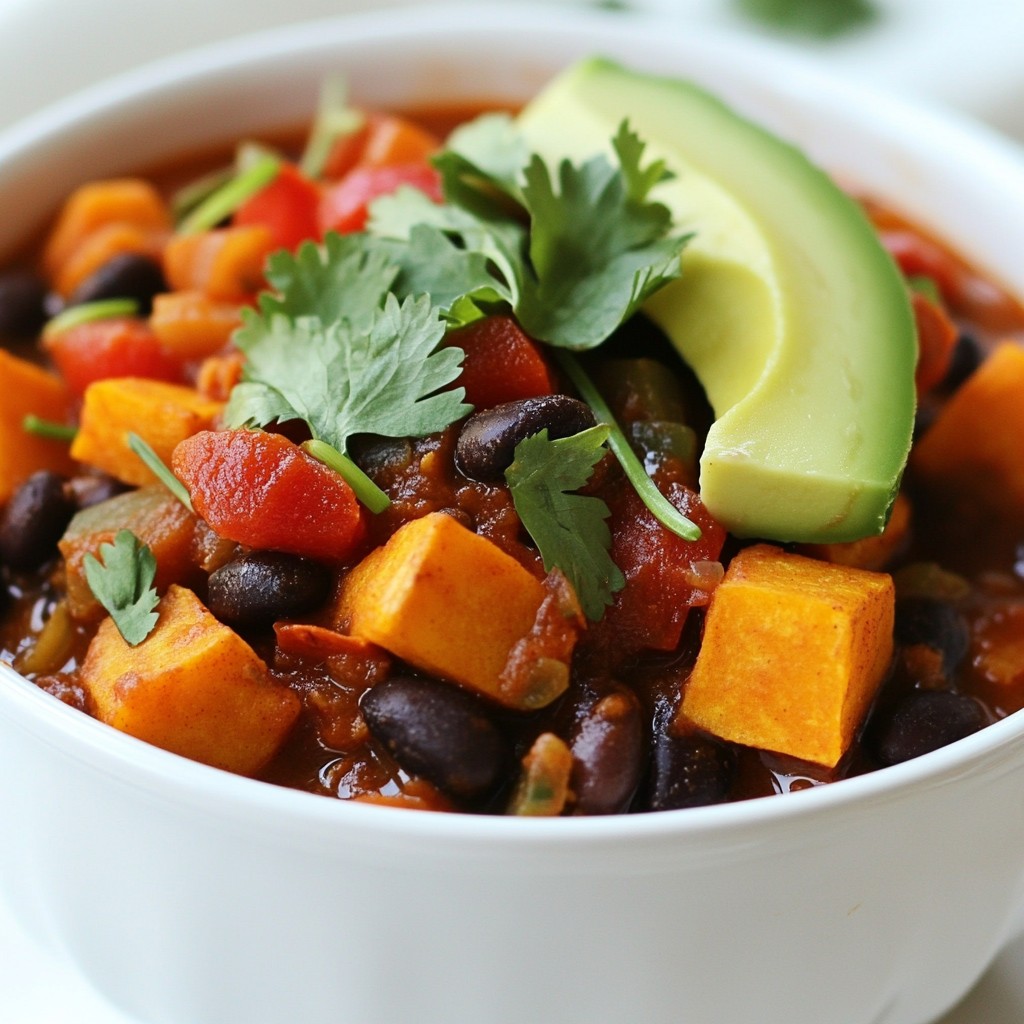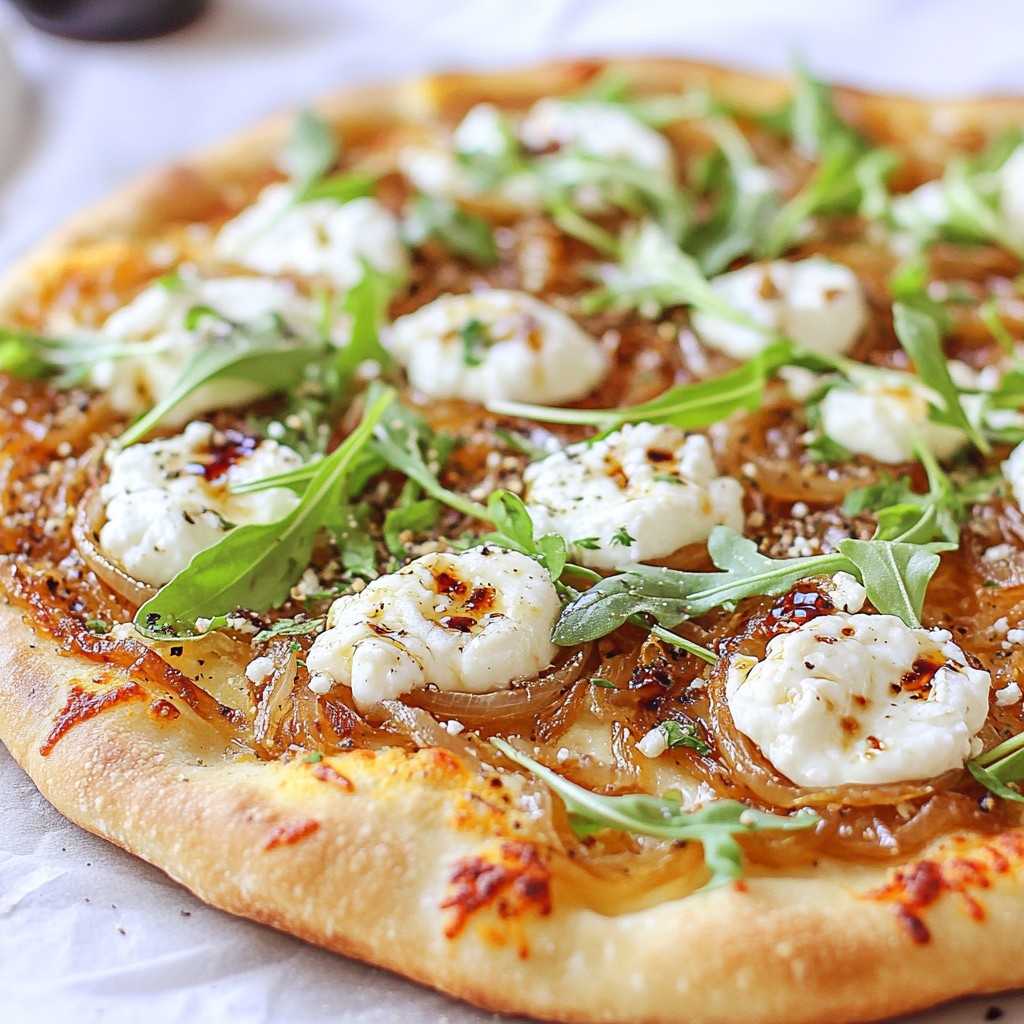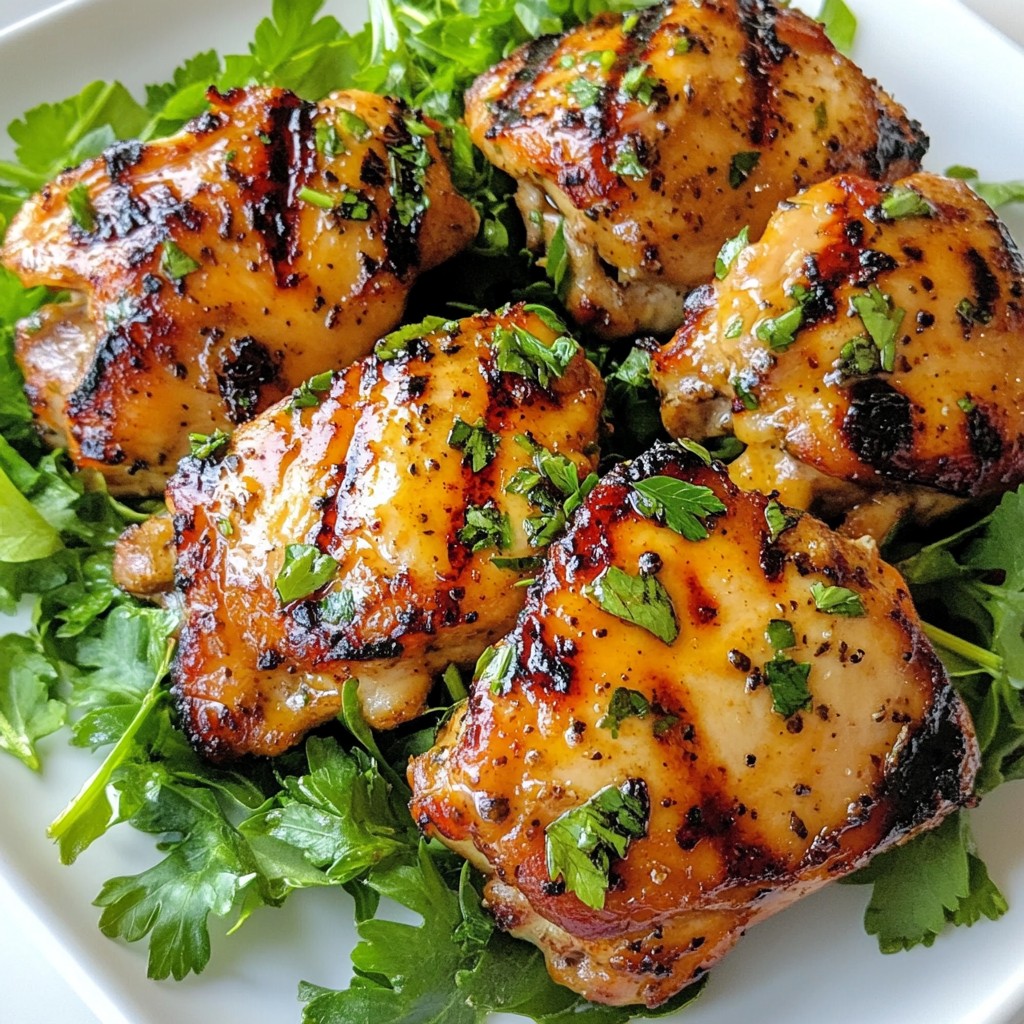Looking for a healthy twist on Pad Thai? You’ve found it! Zucchini Noodle Pad Thai is a delicious way to enjoy this classic dish while cutting carbs. In this post, I’ll guide you step-by-step, sharing my favorite tips, tricks, and ingredient swaps. Whether you’re a plant-based eater or just want more veggies in your meals, this recipe is packed with flavor. Let’s dive into this tasty and colorful dish!
Ingredients
List of Ingredients
– Zucchini and Tofu
– 2 medium zucchinis, spiralized
– 1 cup firm tofu, cubed
– Sauces and Seasonings
– 2 tablespoons peanut butter
– 2 tablespoons soy sauce (or tamari for gluten-free)
– 1 tablespoon lime juice
– 1 tablespoon tamarind paste
– 1 tablespoon coconut sugar (or brown sugar)
– 2 cloves garlic, minced
– 1 tablespoon sesame oil
– Garnishes
– 2 green onions, chopped
– 1/4 cup bean sprouts
– Crushed peanuts for garnish
– Lime wedges for serving
– Fresh cilantro for garnish
This Zucchini Noodle Pad Thai is a fun twist on the classic dish. You get the same great taste with a lighter touch. Zucchini noodles are fresh and full of flavor. They soak up the sauce well, making each bite delicious. Tofu adds a nice protein boost and absorbs all the flavors.
To start, spiralize the zucchinis into noodles. This gives you that nice, noodle-like texture. Next, cube your firm tofu. This will help it brown nicely and hold its shape while cooking. For the sauces, we mix peanut butter, soy sauce, lime juice, tamarind paste, and coconut sugar. This blend creates a sweet and tangy sauce that brings everything together.
Don’t forget the garnishes! Green onions and bean sprouts add a nice crunch and freshness. Crushed peanuts give a delightful crunch, while lime wedges add a tangy kick. Fresh cilantro ties it all together with its unique taste.Enjoy cooking and eating this healthy, tasty meal!
Step-by-Step Instructions
Preparing the Tofu
To start, you need to prepare the tofu. Cut the firm tofu into small cubes. Heat 1 tablespoon of sesame oil in a non-stick skillet over medium heat. Once hot, add the tofu. Cook it for about 5 to 7 minutes. You want it golden brown on all sides. When done, remove the tofu from the skillet and set it aside. This step adds protein and gives a nice texture.
Making the Sauce
Next, let’s make the sauce. In a small bowl, combine 2 tablespoons of peanut butter, 2 tablespoons of soy sauce, 1 tablespoon of lime juice, 1 tablespoon of tamarind paste, and 1 tablespoon of coconut sugar. Whisk these ingredients together until smooth. Taste it, and adjust if needed. This sauce will bring the flavors together in your dish.
Cooking the Zucchini Noodles
Now, it’s time to cook the zucchini noodles. In the same skillet, add 2 cloves of minced garlic. Sauté it for about 30 seconds until it smells great. Then, add the spiralized zucchini noodles. Cook them for 2 to 3 minutes. You want them soft but still a bit crunchy. This helps keep the nutrients intact.
Combining Ingredients
After the zucchini noodles are cooked, add the tofu back into the skillet. Pour the prepared sauce over everything. Toss the noodles and tofu until they are well-coated with sauce. Cook for another 1 to 2 minutes. This step ensures every bite is full of flavor.
Adding Fresh Ingredients
Next, stir in 2 chopped green onions and 1/4 cup of bean sprouts. Cook for one more minute. This adds a fresh crunch to your dish. It also boosts the nutrient content, making it even healthier.
Serving Suggestions
To serve, divide the Zucchini Noodle Pad Thai among your plates. Garnish with crushed peanuts, fresh cilantro, and lime wedges. This adds color and flavor. Enjoy your delicious meal that is both flavorful and healthy!
Tips & Tricks
How to Achieve Perfectly Cooked Zucchini Noodles
To get the best zucchini noodles, start by spiralizing your zucchinis. Use a spiralizer for even noodles. If you don’t have one, a vegetable peeler works too. Aim for thin, long strands to mimic traditional noodles.
Once you spiralize, make sure to salt them lightly. This helps draw out excess moisture. Let them sit for about 10 minutes, then pat them dry with paper towels. This step keeps the dish from becoming watery.
When cooking, sauté the noodles for just 2-3 minutes. You want them tender but still a bit crunchy. Overcooking can make them mushy.
Variations for Flavor Enhancements
If you want to change up the flavors, there are many options. Here are a few ideas:
– Add protein: Try shrimp, chicken, or tempeh for more texture.
– Use different nuts: Swap crushed peanuts for cashews or almonds.
– Spice it up: Add red pepper flakes or sriracha for heat.
– Fresh herbs: Toss in basil or mint for a fragrant twist.
Recommended Cooking Equipment
The right tools make cooking easier and more fun. Here’s what I recommend:
– Spiralizer: For making perfect zucchini noodles.
– Non-stick skillet: Prevents sticking and makes cooking simple.
– Whisk: For mixing your sauce smoothly.
– Measuring spoons: To ensure you get the right amounts.
These tools help you create a delicious Zucchini Noodle Pad Thai that impresses every time.
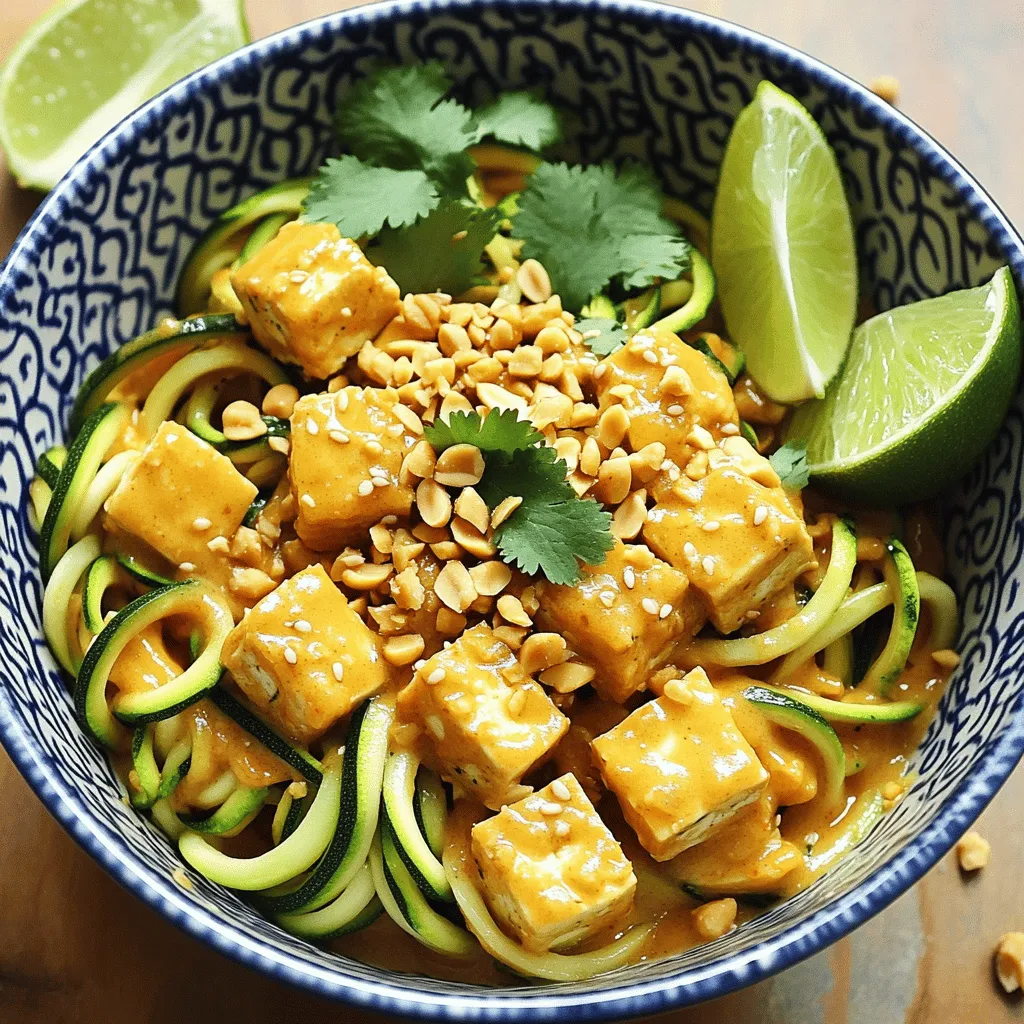
Variations
Adding Proteins or Alternate Proteins
You can add more protein to your Zucchini Noodle Pad Thai. Cooked chicken, shrimp, or even tempeh work well. To keep it simple, just cube the protein and cook it in the skillet. For vegan options, stick with tofu or try chickpeas. They add a nice texture and flavor.
Vegan and Gluten-Free Adjustments
This dish can easily fit a vegan or gluten-free diet. Use tamari instead of soy sauce for a gluten-free option. For a vegan twist, swap the eggs with extra tofu or some veggies. You can also use coconut aminos for a sweet and savory touch without soy.
Customizing Flavor Profiles
You can change the flavors to match your taste. Want it spicy? Add red pepper flakes or sriracha to the sauce. For a sweeter taste, add more coconut sugar. If you like tang, squeeze in more lime juice. This recipe allows you to play with the flavors, making it your own.
Storage Info
How to Store Leftovers
To keep your Zucchini Noodle Pad Thai fresh, place leftovers in an airtight container. This keeps moisture in but prevents any odors from other foods. Store it in the fridge for up to three days. Make sure the dish cools down before sealing the container. This will help avoid steam build-up, which can make the noodles soggy.
Best Practices for Reheating
Reheating Zucchini Noodle Pad Thai is easy. You can use either the microwave or the stove. If using the microwave, place the leftovers in a bowl, cover it loosely, and heat for about one to two minutes. Stir halfway through for even heating. If you prefer the stove, add a splash of water or oil in a skillet over medium heat. Heat for about three to five minutes, stirring gently. This method helps refresh the texture of the noodles.
Freezing Options for Meal Prep
You can freeze Zucchini Noodle Pad Thai, but the texture changes when thawed. To freeze, let the dish cool completely. Then, portion it into freezer-safe bags or containers. Remove as much air as possible to prevent freezer burn. It can last for up to three months in the freezer. When you’re ready to eat, thaw it overnight in the fridge before reheating. For best results, consider cooking fresh zucchini noodles when you’re ready to serve.
FAQs
What are the benefits of using zucchini noodles?
Zucchini noodles are low in calories and carbs. They add vitamins and minerals to your diet. Zucchini is high in fiber, which helps digestion. Using zucchini noodles instead of traditional pasta makes meals lighter. This swap also boosts your veggie intake. They are gluten-free, making them a great choice for many people. You can easily spiralize zucchini at home, which is fun and simple. Plus, they soak up flavors well, making your Zucchini Noodle Pad Thai even tastier.
Can I make Zucchini Noodle Pad Thai ahead of time?
Yes, you can prepare Zucchini Noodle Pad Thai in advance. Cook the dish, then store it in an airtight container. Keep it in the fridge for up to three days. When you’re ready to eat, just reheat it in a skillet. This method helps save time for busy days. However, the zucchini noodles may lose some crunch after reheating. To keep them fresh, consider making the sauce and tofu ahead, then add the zucchini noodles just before serving.
How can I make this dish spicier?
To add heat, try using chili paste or sriracha. Mix it into the sauce for a spicy kick. You can also add red pepper flakes when cooking the zucchini. If you enjoy fresh heat, toss in sliced fresh chili peppers. Start with a little, then taste to see if you want more. Remember, you can always add spice, but it’s hard to take it away.
What are some side dishes to serve with Pad Thai?
Pad Thai pairs well with light side dishes. Try a simple cucumber salad for a refreshing crunch. A Thai-style mango salad adds sweetness and flavor. You can also serve spring rolls with a dipping sauce. These options keep the meal balanced and fun. They enhance your dining experience without overshadowing the main dish.
Where can I find tamarind paste?
You can find tamarind paste in many grocery stores. Look in the international aisle, especially near Asian or Indian foods. It is often near other sauces and pastes. You can also find it in health food stores. If you prefer online shopping, many websites sell tamarind paste. This ingredient adds a unique tangy flavor to your Zucchini Noodle Pad Thai. If you can’t find it, consider using lime juice as a substitute, though the taste will differ.
In this blog post, I covered the key ingredients for a tasty Zucchini Noodle Pad Thai. You learned how to prepare tofu, make the sauce, and cook zucchini noodles. I shared tips for achieving the right texture, along with storage and serving ideas.
Consider trying variations to suit your taste, like adding proteins or enhancing flavors. Embrace the creativity in cooking this dish. Enjoy your Pad Thai adventure!
